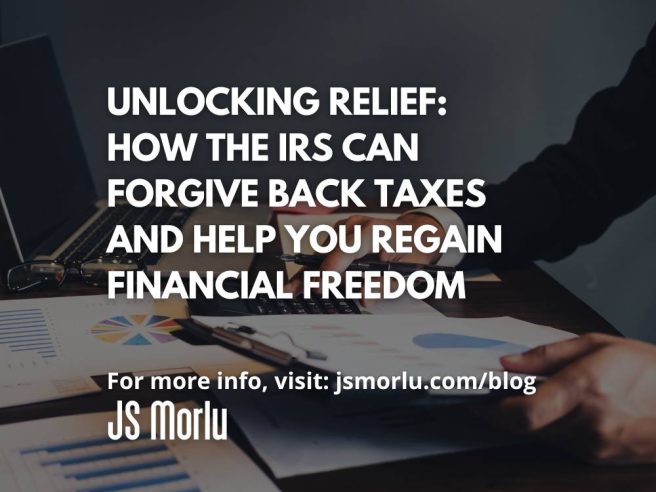By: John S. Morlu II, CPA
Owing back taxes to the IRS can feel overwhelming. The agency is well-known for its ability to pursue unpaid taxes aggressively, armed with legal tools that include penalties, interest charges, and even potential legal action. For many taxpayers, the idea of being in debt to the IRS conjures up images of never-ending financial stress.
If you’re dealing with unpaid taxes, you might be wondering: Can the IRS forgive back taxes? The answer is yes, but it’s not automatic or easy. The IRS has programs that can help taxpayers resolve their tax debts, but you need to meet specific criteria and take proactive steps. Let’s break it down and explore your options.
Why Back Taxes Are a Big Deal
Unpaid taxes come with a hefty price tag:
- Penalties: The IRS charges a failure-to-pay penalty, which can grow over time.
- Interest: Interest is added to the balance, making the debt grow even faster.
- Collection Efforts: The IRS can garnish wages, levy bank accounts, and file tax liens to collect the money owed.
The longer you wait to address unpaid taxes, the more challenging it becomes to resolve the debt. However, the IRS recognizes that not everyone can pay their full tax liability. That’s where their relief programs come into play.
Ways the IRS Can Forgive Back Taxes
While tax forgiveness isn’t common, it is possible under certain circumstances. Here are the primary ways the IRS may forgive or reduce your back taxes:
1. The 10-Year Statute of Limitations
The IRS doesn’t have forever to collect unpaid taxes. By law, they have 10 years from the date the tax debt was assessed to collect what you owe. If they don’t collect within this period, the remaining balance is forgiven.
This 10-year period is called the Collection Statute Expiration Date (CSED). However, the clock doesn’t always run continuously. It can be paused or extended in certain situations, such as:
- Filing for bankruptcy: The clock is paused during bankruptcy proceedings.
- Living abroad: If you leave the U.S. for an extended period, the clock stops until you return.
- Submitting an Offer in Compromise (OIC): If you propose a settlement with the IRS, the clock is paused while they review your offer.
Tip: Knowing your CSED can be a powerful tool in managing your tax debt. You can request your account transcripts from the IRS to determine your collection expiration date.
2. Offers in Compromise (OIC)
An Offer in Compromise allows you to settle your tax debt for less than the full amount owed if paying in full would cause financial hardship. The IRS looks at:
- Your income
- Your expenses
- Your assets and equity
To qualify, you must show that you cannot reasonably pay the full amount, even over time. The IRS uses strict guidelines to evaluate OIC applications, and most are rejected. However, if accepted, it can provide significant relief.
Example: Suppose you owe $50,000 but have limited income and no assets. You may be able to negotiate an offer to pay a smaller amount, such as $10,000, as a full settlement.
3. Innocent Spouse Relief
If your tax debt resulted from your spouse (or ex-spouse) underreporting income or claiming improper deductions or credits, you might qualify for Innocent Spouse Relief. This program can relieve you of responsibility for taxes associated with your spouse’s actions if you had no knowledge of the error.
4. Currently Not Collectible (CNC) Status
If you can’t pay your tax debt and cover basic living expenses, you may qualify for Currently Not Collectible (CNC) status. This doesn’t erase your debt, but it temporarily halts collection actions like wage garnishments or bank levies.
While in CNC status, the IRS may still add penalties and interest to your balance, but they won’t actively try to collect the debt. If your financial situation improves, collection efforts may resume.
5. First-Time Penalty Abatement
If you’ve always been compliant with your taxes and find yourself facing penalties for the first time, you may qualify for the First-Time Penalty Abatement program. This allows the IRS to waive certain penalties for one tax year if you meet the eligibility requirements.
Example: If you forgot to file your taxes one year but have a clean history, you could request penalty abatement, reducing the overall amount owed.
What About Investment Income?
Investment income, such as interest, dividends, or capital gains, generally doesn’t qualify for forgiveness. The IRS focuses on core issues like financial hardship or legal exceptions to consider tax relief.
How to Get Started
If you believe you may qualify for tax forgiveness, follow these steps:
1. Gather Your Financial Information:
Collect documents showing your income, expenses, and assets.
2. Contact the IRS:
You can call the IRS directly or work with a tax professional to explore your options.
3. Explore Payment Plans:
Even if you don’t qualify for forgiveness, the IRS offers payment plans that allow you to pay your debt over time.
4. Consider Professional Help:
A tax professional can help you navigate the IRS’s programs and present your case effectively.
Key Takeaways
- The IRS can forgive back taxes, but it’s not automatic or easy.
- The 10-year statute of limitations can result in tax forgiveness if the IRS doesn’t collect within that time.
- Programs like Offers in Compromise, Innocent Spouse Relief, and Currently Not Collectible status provide ways to manage or reduce tax debt.
- Penalties may be waived under the First-Time Penalty Abatement program for eligible taxpayers.
Final Thoughts
While the IRS is a tough collector, they recognize that some taxpayers genuinely cannot pay their full tax liability. If you’re struggling with back taxes, don’t ignore the problem—it will only grow worse. Instead, explore the options available for resolving or reducing your debt. With careful planning and the right approach, you may find a path to financial relief and a fresh start.
Author: John S. Morlu II, CPA
John S. Morlu II, CPA, is the CEO and Chief Strategist of JS Morlu, a globally acclaimed public accounting and management consulting powerhouse. With his visionary leadership, JS Morlu has redefined industries, pioneering cutting-edge technologies across B2B, B2C, P2P, and B2G landscapes.
The firm’s groundbreaking innovations include:
• ReckSoft (www.ReckSoft.com): AI-driven reconciliation software revolutionizing financial accuracy and efficiency.
• FinovatePro (www.FinovatePro.com): Advanced cloud accounting solutions empowering businesses to thrive in the digital age.
• Fixaars (www.fixaars.com): A global handyman platform reshaping service delivery and setting new benchmarks in convenience and reliability.
Under his strategic vision, JS Morlu continues to set the gold standard for technological excellence, efficiency, and transformative solutions.
JS Morlu LLC is a top-tier accounting firm based in Woodbridge, Virginia, with a team of highly experienced and qualified CPAs and business advisors. We are dedicated to providing comprehensive accounting, tax, and business advisory services to clients throughout the Washington, D.C. Metro Area and the surrounding regions. With over a decade of experience, we have cultivated a deep understanding of our clients’ needs and aspirations. We recognize that our clients seek more than just value-added accounting services; they seek a trusted partner who can guide them towards achieving their business goals and personal financial well-being.
Talk to us || What our clients says about us




